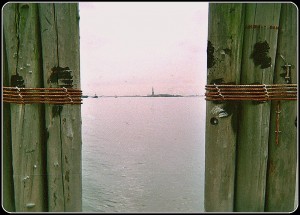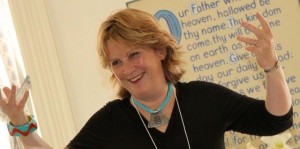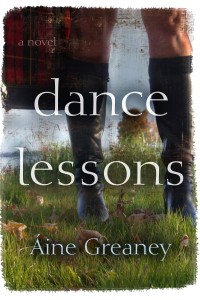My Big Fake Immigrant Memoir
Let’s face it, the American immigration story has been done to death. It’s the “been-there-wrote-that” tale. So would someone please tell why I’m sitting here writing a book-length memoir about leaving my native Ireland, at age 24, to come alone to live in America?
While I’m penning my woman’s immigrant story, the very same story is being played out in the federal government.
Yep, as you read this, as fast as you can say, “Immigration reform,” “Hotel housekeeping!” or, “You want fries with that?” America’s immigration story—and all its revisionist versions—is playing in high definition surround sound in our nation’s capitol.
So at best, my immigrant story seems derivative. At worst, it stands the chance of being fake or defensive.
As I write this first draft, I hear the past voices from newspaper editorials or from cocktail parties or the Thanksgiving dinner table: You’re the one who came. So if you don’t like it here, you can just leave.
But that’s the thing. With all its flaws and foibles, I do like it here in America. If I didn’t, my 26 years here would be one untreated and chronic case of self-flagellation.
But let’s look on the bright side. Re-doing a done-to-death classic gives us a template to work from. At least in the creative versions, and at least for those of us born lucky and Caucasian enough not to have been detained or deported, the immigration story is a literary trope.
It unfolds in three acts:
Act 1: Immigrant decides or is forced to leave the country of her birth (Cut to weepy scenes on the dock or in the airport departure lounge)
Act 2: Immigrant encounters many adjustment hiccups, including the waves of homesickness, the stereotypical comments and the assortment of cash ‘n carry jobs. PG-13 warning: Act 2 also includes some slapstick scenes of lost-in-translation mishaps. (Cut to scene with the waiter and the Michelob)
Act 3: Plot climax: After two decades, the immigrant lifts her head from all this working and living and adjusting to ask: “Jeez, where do I call home?” Plot dénouement: Immigrant answers her own question by living and working in her adopted country. (Fade to sunset and happy-ever-after music)
So, in an otherwise busy, two-job life, what would induce me to write the plot that’s already written and written – a plot that may never get a publisher or an agent or sit in someone’s Kindle?
It’s not that this project feels right—though it does. It’s more that my other, abandoned projects felt wrong. For an entire year-and-a-half, I knew that there was something stalking me—the very same thing that was stalling those other non-starter books.
Also, just like for my other published works, things happened in a kind of spooky-karma-gut-twisting way.
The first thing was that two different audio magazines accepted four of my audio essays on this topic of being an expatriate in America. Truthfully, I was kind of stunned, and never really thought of my years here, my landing in JFK Airport, New York with a backpack, as a story.
The second thing: One day I was out for a walk and … here was this book title pulsing in my head.
The third spooky-karma-gut thing: A few days later, someone at work left an article on my desk with a quote from Carl Gustav Jung, the Swiss psychotherapist and psychiatrist who founded analytical psychology: “The privilege of a lifetime is to become who you truly are.”

Voila. A memoir was born. And very soon after it took its first breath, I could hear its distinctive voice. I saw the color of its eyes and the curve of its eyelashes. I felt the soft, pillowy flesh under its damp hairline. Thanks to Carl Jung, my memoir wouldn’t just be about a girl crossing borders, a girl abandoning one country to go live in another. It would also be about the internal borders that I and many writers have crossed in order to reach that other, existential domicile – aka, “who you truly are.”
And then, here came that bigger question: As women, would we ever claim that “privilege,” would we ever dare to voice our need for that privilege if we hadn’t exited stage left? If we hadn’t abandoned all the familiar and homey props of language and geography and religion and heritage?
I’m calling my memoir What Brought You Here. The title is a borrowed phrase, an echo from all of those occasions when an American heard my accent and asked: “What Brought You Here?”
In my early years, the response was both glib and untrue (“Oh, I wanted an American adventure—giggle, giggle”). But now I’m middle-aged. Now I know that this question deserves – no, demands – a long and thoughtful response.
I am writing this memoir to refute all the glib, facile reasons that I’ve told to others, including myself. And I’m writing it to hold my two cultures accountable – the old country and the new – for all of their facile answers and stories – the ones that are designed to neuter our individuality and humanity.
Truthfully, the what-brought-you-here story is wrenching my gut and stretching my intellect. It’s also reminding me why we bother to write in the first place. We write not to spin our own allegory, but to pose our own questions, to mine our own truth.
Questions? Truth? Well, now. Surely there’s nothing derivative or fake about those?
—
Aine Greaney is an Irish born, American residing, author of Dance Lessons, who is now working on her memoir, What Brought You Here. Follow Aine Greaney on Twitter, @AineGreaney. This is the fourth essay Aine Greaney has contributed to Women Writers, Women, Books.
Category: Expatriate Writers, Irish Women Writers, Women Writing Memoirs
Comments (6)
Trackback URL | Comments RSS Feed
Sites That Link to this Post
- Featuring Women Writers on WWWB 2013 - Women Writers, Women Books | December 30, 2013






I agree with you Aine, midlife does demand that we stand at the cross in the road and ask ourselves where we are going via answering the question of where we have been. Your story isn’t just a metaphor but a literal leaving and traveling thousands of miles. Every immigrant has a story beneath the adventure and I look forward to reading yours.
Thank you, Elena. I’m glad that you’re finding that about midlife, too. Sometimes I think it’s just a temporary madness, but then, it does seem like a blessing to be able to stop and assess. Hope all is well and you’re looking forward to a summer full of your own writing.
Thanks, Dianne, for your kind words. Yes, I think all of us (or hopefully most of us anyway) go through that process–perhaps one of the benefits of middle age?
Thanks again,
Aine
I found this post thought provoking. My mother was first generation born here and her parents came from England. My father’s family came to America several generations ago. What really stood out to me is whether we were born in the United States or not we go through a process of finding out who we really are. Part of that is where our families came from.
Thanks, Dianne. I like your perspective. I know some author has written some wise quote about digging into our pasts to map our future, but I can’t remember who it is. But in any case, I think it holds true for many of our journeys.